Election law bars Stephen Harper from 2015 election. Found guilty and plead guilty to violations of law
Corruption, World news Sunday, July 19th, 2015In 2011 the Stephen Harper lead federal Conservatives party and his fundraising arm “plead guilty” to charges the Stephen Harper lead party violated the Elections Act (law) by exceeding election spending limits and filing election records that didn’t include all of its expenses. Instead of being ousted once again for violation of federal law, Stephen Harper, his party and his fundraising arm paid fines of $50,000 and $2,000, respectively, to settle the criminal case.
The Canada Elections Act, which was passed in 2000 bars individuals found guilty of election-related crimes, illegal practice and are prohibited from becoming members for five years (in some cases, seven years) after conviction. For all intensive purposes, paying a fine or fines to settle a criminal case, is an admission of guilt by the perpetrator and a conviction by the courts.
The highest duty of a Prime Minister of Parliament is to uphold the Constitution of Canada (the law), which includes the rights and privileges of the House of Commons and the duties owed to our elected representative in Canada. Stephen Harper keeps on failing in his duties on both counts as evidenced by 2 consecutive prorogation of Parliament. Stephen Harper forced our elected representative to dissolve Parliament just so that he and his Conservatives could avoid losing a vote of confidence in the House of Commons and willfully and deliberately obstruct justice regarding complicity in the heinous war crime act of torture.
The first undemocratic shut down of Parliament by Stephen Harper was clearly to avoid the scrutiny of a House of Commons committee over the mounting evidence of willful complicity by the Harper government over the transfer of Afghan detainees to a substantial risk of torture. This is a war crime and one of the most serious allegations any government has faced in the history of Canada. Stephen Harper did everything possible to hide from a vote of confidence, and on Dec. 4, 2008 Stephen Harper unilaterally shut down Parliament. The Governor General had little option but to grant the undemocratic request to avoid a political crisis in Canada.
There was no precedent in any parliamentary democracy anywhere in the world where a democratic parliament was shut down to escape a vote of no confidence. It opened the door for other abuses of the rights and privileges of the majority of Members of Parliament elected by Canadians. Harper has went through that door again. This time the Governor General did not even merit a personal visit by Stephen Harper to be told to shut down Parliament until early March. Respect, even for the Crown’s (Pope) representative, by Stephen Harper is in short supply.
This undemocratic criminal behavior by Stephen Harper is another piece of evidence of a major shift in Canadian constitutional democracy taking shape. First, there was the unconstitutional behavior of the Harper government to deny the committee uncensored documents despite a subpoena by the House of Commons. Secondly, there was the Harper ordered boycott of the committee by the Conservative MPs at the committee. Thirdly, we saw the forced adjournment of the Military Police Complaints Commission inquiry of the Stephen Harper’s complicity in torture and the Stephen Harper firing of its chief investigator, Peter Tinsley. This commission, a quasi-judicial tribunal has been stymied in its attempt to determine the truth over the detainee transfer issue. Finally, there was the unprecedented attempts by Stephen Harper to slander Richard Colvin, a senior Canadian diplomat who was a key witness in the Canadian Afghan detainee issue, for just doing his job of speaking truth to power and then accusing anybody who supports him of either being Taliban dupes or undermining our brave Canadian military heroes.
These are serious examples of abuse of executive power over Parliament, the government of Canada, the public service and ultimately the Canadian voters who elected MPs to make Parliament work. There is only one person who is responsible for and has been found guilty of such abuse of power, for such disdain towards the authority of the people’s Parliament, for such disrespect towards the Canadian people and for total disregard for the rule of law. His name is Stephen Harper.
How does the Canada Elections Act’s 5 year penalty effectively bar Stephen Harper from running in 2015 election? In 2011 the Conservative Party of Canada, under Stephen Harper’s leadership, was found guilty of Contempt of Parliament and then later in the same year plead guilty to charges the Stephen Harper lead party violated the Elections Act (law) by exceeding election spending limits and filing election records that didn’t include all of its expenses. “In and Out” scandal. http://www.cbc.ca/news/politics/conservative-party-fined-for-breaking-election-laws-1.1076877
Year 2011 + Canada Elections Act barring individuals found guilty of election-related crimes and are prohibited from becoming members for five years (in some cases, seven years) after conviction = 2016
2011 guilty convictions + 5 years = 2016
Canada’s federal election is in 2015, not 2016. Stephen Harper is barred for another year from running in 2015 election or from becoming a member of the Canadian government.
In 2003, Canadian Alliance leader, Stephen Harper and the Progressive Conservative Party of Canada leader, Peter MacKay, voted to unite and betray their 2 parties, as the new Conservative Party of Canada, and Mr. Harper made himself the party’s first leader and only leader.
Being that the Conservative Party of Canada was founded and has only been lead by Stephen Harper and his political doctrine and agendas, the Conservative Party of Canada legally and politically represents only Stephen Harper. Any and all violations of law and convictions for violations of law are Stephen Harper’s crimes, indictments and convictions.
Short URL: https://presscore.ca/news/?p=11095



 The Halifax International Security Forum was founded in 2009 as a propaganda program within the German Marshall Fund (founded June 5, 1972 by West German Chancellor Willy Brandt) by the Crown in Canada using Crown Corp ACOA & DND funds. The Halifax International Security Forum is a front that is used to recruit top US, UK and Canadian gov and military officials as double agents for Canada's WWI, WWII enemy and wage new Vatican Germany Cold War.
High Treason: s.46 (1) Every one commits high treason who, in Canada (c) assists an enemy at war with Canada, ..., whether or not a state of war exists". Every one who, in Canada assists Canada's enemies wage "piecemeal WWIII" Cold War by organizing, funding and participating in the Germany government politically and militarily benefitting / lead Halifax International Security Forum is committing high treason.
The Halifax International Security Forum was founded in 2009 as a propaganda program within the German Marshall Fund (founded June 5, 1972 by West German Chancellor Willy Brandt) by the Crown in Canada using Crown Corp ACOA & DND funds. The Halifax International Security Forum is a front that is used to recruit top US, UK and Canadian gov and military officials as double agents for Canada's WWI, WWII enemy and wage new Vatican Germany Cold War.
High Treason: s.46 (1) Every one commits high treason who, in Canada (c) assists an enemy at war with Canada, ..., whether or not a state of war exists". Every one who, in Canada assists Canada's enemies wage "piecemeal WWIII" Cold War by organizing, funding and participating in the Germany government politically and militarily benefitting / lead Halifax International Security Forum is committing high treason.
 Please take a moment to sign a petition to
Please take a moment to sign a petition to 











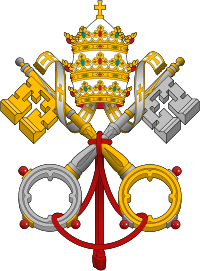






















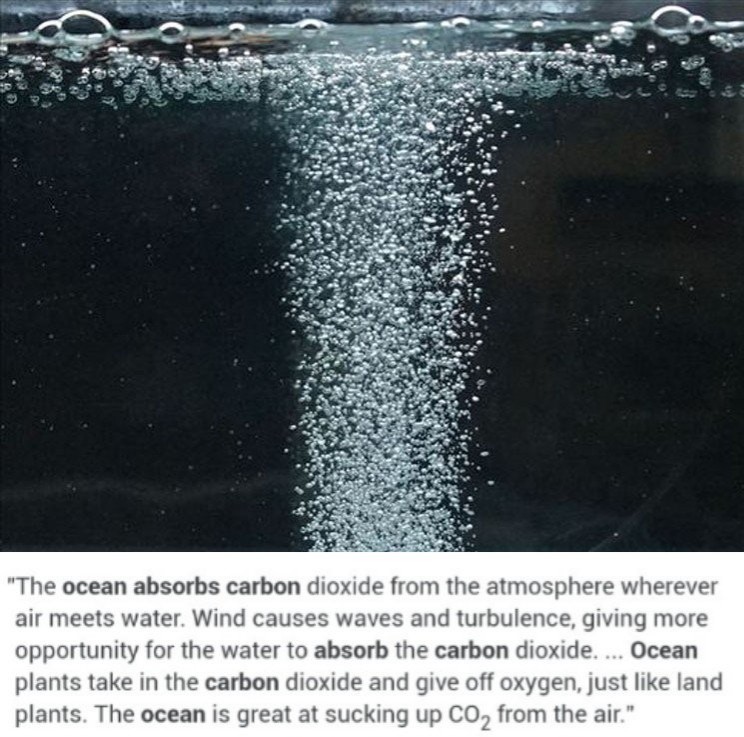
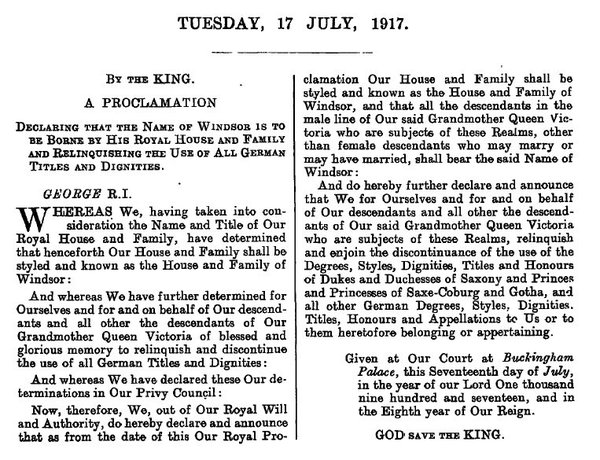




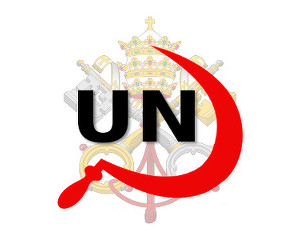
 1917 Code of Canon Law, Canon 185 invalidates (voids) all papacies since October 26, 1958 due to the fact Cardinal Giuseppe Siri was elected Pope on the Third ballot on Oct 26 1958 but the new Pope Gregory XVII was illegally prevented from assuming the office. A Pope was elected on October 26, 1958. Thousands of people witnessed a new Pope being elected by seeing white smoke and millions were informed by Vatican radio broadcasts beginning at 6:00 PM Rome time on October 26, 1958. The papacy of Francis, Benedict, John Paul II, John Paul I, Paul VI, John XXIII and any and all of their respective doctrines, bulls, letter patents and the Second Vatican Council are all invalidated (having no force, binding power, or validity) by Canon 185 because the 1958 conclave of cardinals elected Cardinal Giuseppe Siri Pope on Oct 26 1958. Cardinal Giuseppe Siri accepted the papacy by taking the name Pope Gregory XVII but was illegally prevented from assuming his elected office.. According to Canon 185 Cardinal Angelo Giuseppe Roncalli illegally assumed the papacy 2 days later by fraud and grave fear, unjustly inflicted against Cardinal Giuseppe Siri who was lawfully elected Pope Gregory XVII. Because no Pope has been lawfully elected since October 26, 1958 the Holy See (la Santa Sede/Seat) remains vacant.
1917 Code of Canon Law, Canon 185 invalidates (voids) all papacies since October 26, 1958 due to the fact Cardinal Giuseppe Siri was elected Pope on the Third ballot on Oct 26 1958 but the new Pope Gregory XVII was illegally prevented from assuming the office. A Pope was elected on October 26, 1958. Thousands of people witnessed a new Pope being elected by seeing white smoke and millions were informed by Vatican radio broadcasts beginning at 6:00 PM Rome time on October 26, 1958. The papacy of Francis, Benedict, John Paul II, John Paul I, Paul VI, John XXIII and any and all of their respective doctrines, bulls, letter patents and the Second Vatican Council are all invalidated (having no force, binding power, or validity) by Canon 185 because the 1958 conclave of cardinals elected Cardinal Giuseppe Siri Pope on Oct 26 1958. Cardinal Giuseppe Siri accepted the papacy by taking the name Pope Gregory XVII but was illegally prevented from assuming his elected office.. According to Canon 185 Cardinal Angelo Giuseppe Roncalli illegally assumed the papacy 2 days later by fraud and grave fear, unjustly inflicted against Cardinal Giuseppe Siri who was lawfully elected Pope Gregory XVII. Because no Pope has been lawfully elected since October 26, 1958 the Holy See (la Santa Sede/Seat) remains vacant.
 Hold the Crown (alias for temporal authority of the reigning Pope), the Crown appointed Governor General of Canada David Lloyd Johnston, the Crown's Prime Minister (servant) Stephen Joseph Harper, the Crown's Minister of Justice and Attorney General Peter Gordon MacKay and the Crown's traitorous military RCMP force, accountable for their crimes of treason and high treason against Canada and acts preparatory thereto. The indictment charges that they, on and thereafter the 22nd day of October in the year 2014, at Parliament in the City of Ottawa in the Region of Ontario did, use force and violence, via the staged false flag Exercise Determined Dragon 14, for the purpose of overthrowing and besieging the government of Canada contrary to Section 46 of the Criminal Code. In a society governed by the rule of law, the government and its officials and agents are subject to and held accountable under the law. Sign the online
Hold the Crown (alias for temporal authority of the reigning Pope), the Crown appointed Governor General of Canada David Lloyd Johnston, the Crown's Prime Minister (servant) Stephen Joseph Harper, the Crown's Minister of Justice and Attorney General Peter Gordon MacKay and the Crown's traitorous military RCMP force, accountable for their crimes of treason and high treason against Canada and acts preparatory thereto. The indictment charges that they, on and thereafter the 22nd day of October in the year 2014, at Parliament in the City of Ottawa in the Region of Ontario did, use force and violence, via the staged false flag Exercise Determined Dragon 14, for the purpose of overthrowing and besieging the government of Canada contrary to Section 46 of the Criminal Code. In a society governed by the rule of law, the government and its officials and agents are subject to and held accountable under the law. Sign the online  Two of the most obvious signs of a dictatorship in Canada is traitorous Stephen Harper flying around in a "military aircraft" and using Canadian Special Forces "military" personnel from JTF2 and personnel from the Crown's traitorous martial law "military" RCMP force as his personal bodyguards.
Two of the most obvious signs of a dictatorship in Canada is traitorous Stephen Harper flying around in a "military aircraft" and using Canadian Special Forces "military" personnel from JTF2 and personnel from the Crown's traitorous martial law "military" RCMP force as his personal bodyguards.

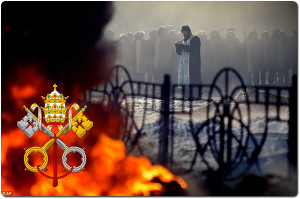
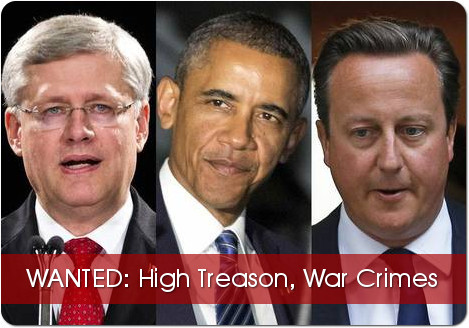

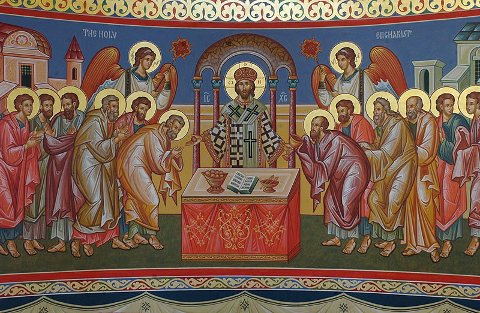

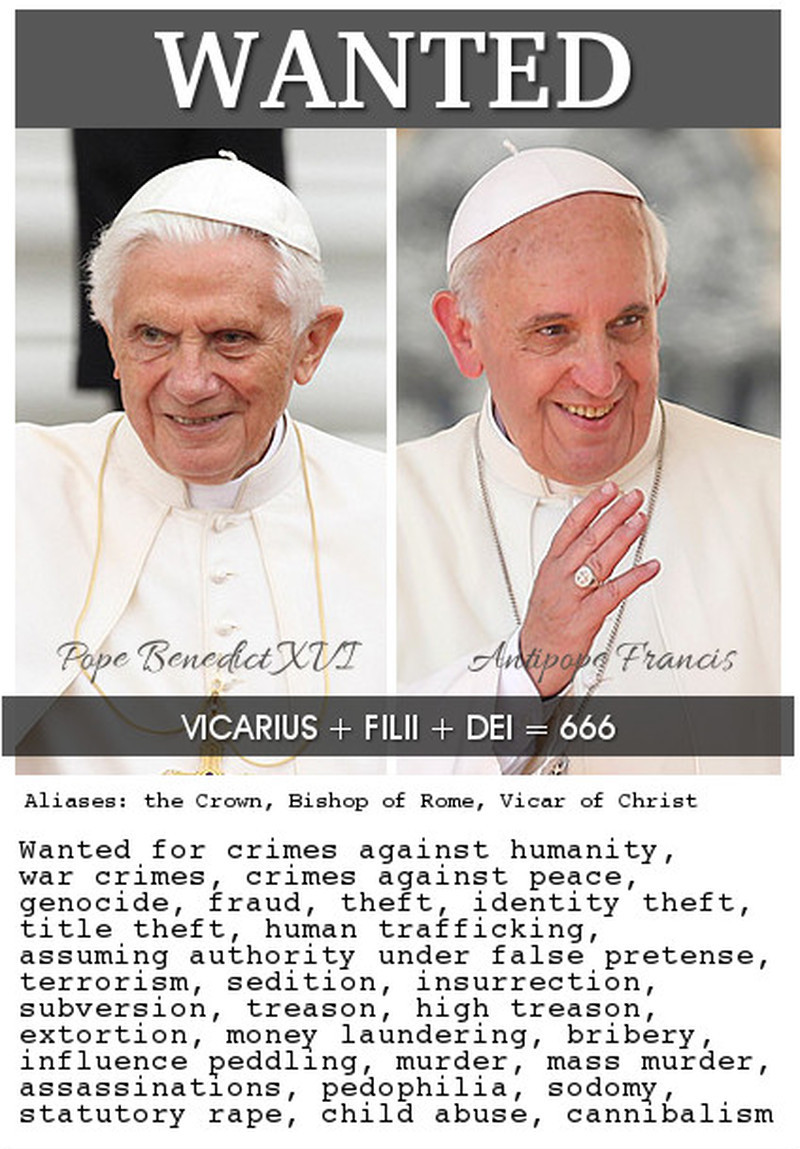















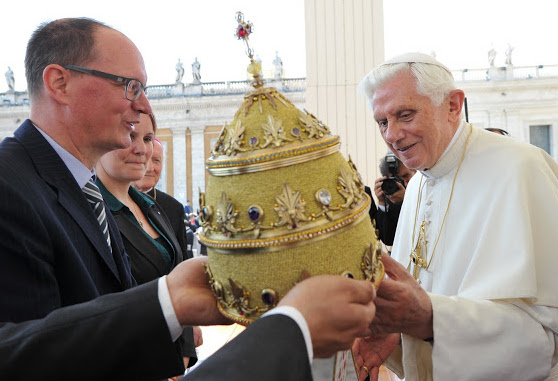


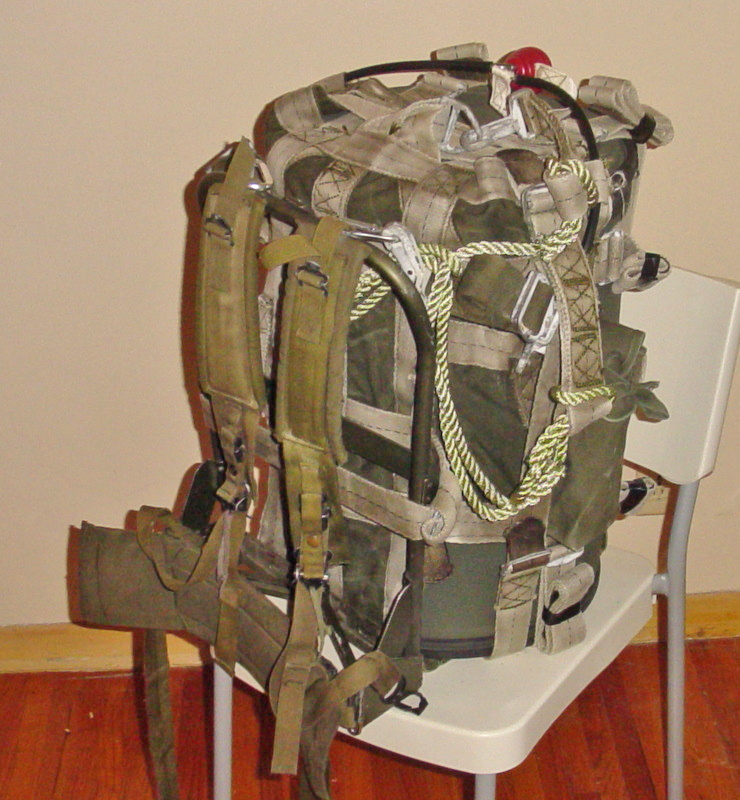
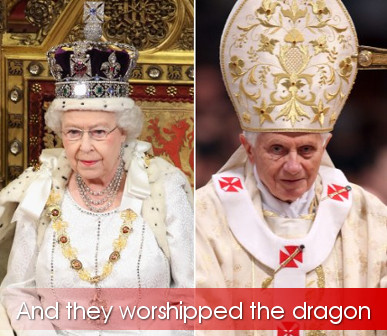







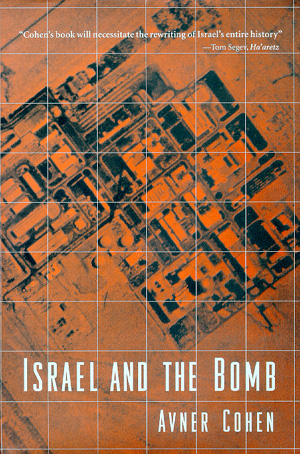


Charge of war crimes should be sufficient to bar Stephen Harper from any and all elections.
Crimes Against Humanity and War Crimes Act
S.C. 2000, c. 24
Genocide, etc., committed outside Canada
6. (1) Every person who, either before or after the coming into force of this section, commits outside Canada
(a) genocide,
(b) a crime against humanity, or
(c) a war crime,
is guilty of an indictable offence and may be prosecuted for that offence in accordance with section 8.
Conspiracy, attempt, etc.
(1.1) Every person who conspires or attempts to commit, is an accessory after the fact in relation to, or counsels in relation to, an offence referred to in subsection (1) is guilty of an indictable offence.
Punishment
(2) Every person who commits an offence under subsection (1) or (1.1)
(a) shall be sentenced to imprisonment for life, if an intentional killing forms the basis of the offence; and
(b) is liable to imprisonment for life, in any other case.
Marginal note:Definitions
(3) The definitions in this subsection apply in this section.
“crime against humanity”
“crime against humanity” means murder, extermination, enslavement, deportation, imprisonment, torture, sexual violence, persecution or any other inhumane act or omission that is committed against any civilian population or any identifiable group and that, at the time and in the place of its commission, constitutes a crime against humanity according to customary international law or conventional international law or by virtue of its being criminal according to the general principles of law recognized by the community of nations, whether or not it constitutes a contravention of the law in force at the time and in the place of its commission.
“genocide”
“genocide” means an act or omission committed with intent to destroy, in whole or in part, an identifiable group of persons (the Taliban), as such, that at the time and in the place of its commission, constitutes genocide according to customary international law or conventional international law or by virtue of its being criminal according to the general principles of law recognized by the community of nations, whether or not it constitutes a contravention of the law in force at the time and in the place of its commission.
“war crime”
“war crime” means an act or omission committed during an armed conflict that, at the time and in the place of its commission, constitutes a war crime according to customary international law or conventional international law applicable to armed conflicts, whether or not it constitutes a contravention of the law in force at the time and in the place of its commission.
There is no statute of limitations for war crimes or crimes against humanity. Stephen Harper has immunity as established by the Hague Convention.
273 presscore.ca readers believe Stephen Harper should be charged with war crimes and crimes against humanity committed in the unlawful invasion and occupation of Afghanistan. 273 have electronically signed “Harper War Crimes Petition” http://presscore.ca/war-crimes-petition
We petition the courts to indict Canadian Prime Minister Stephen Harper and Defense Minister Peter MacKay for war crimes and crimes against humanity, committed in the unlawful invasion and occupation of Afghanistan.
Prosecutions should include the following crimes, committed by the accused in their official capacities:
1) Planning for, preparing for and participation in armed attacks against the civilian population of Afghanistan;
2) Complicity in the commission of torture of Afghan detainees.
3) Supporting an ally that condones and employs ‘waterboarding’ and other unlawful torture techniques.
4) Using inhumane restraints on prisoners, including hoods, and cable ties.
5) Using aggressive armed patrols and attacks indiscriminately, traumatizing and killing women and children and destroying civilian homes and property.
6) Providing military armed support and protection for the illicit Opium drug trade, for drug warlords, grow ops and drug traffickers.
7) Deceit and conspiracy for war, and providing false news to incite passions for war, causing the deaths of thousands of Afghan civilians, forcing millions of Afghan civilians to flee their homes and country, and causing countless maiming and trauma.
8) Conspiracy and complicity in armed attacks against civilians and civilian property as a means of forced deportation and forcible transfer of population, for the purpose of unlawfully appropriating land for the construction of the Trans-Afghan Natural Gas Pipeline.
Section 65 and 502 of the Canada Elections Act (elections law) bars Contempt of Parliament disentitled Stephen Harper from being a candidate running in 2015 election
Link to Canada Elections Act: http://laws-lois.justice.gc.ca/PDF/E-2.01.pdf